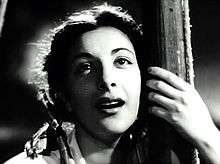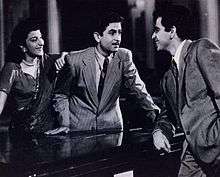Nargis
| Nargis | |
|---|---|
 Nargis in Awaara | |
| Born |
Fatima Rashid 1 June 1929 Calcutta, British India (now Kolkata, India) |
| Died |
3 May 1981 (aged 51) Mumbai, Maharashtra, India |
| Nationality | Indian |
| Occupation | Actress |
| Years active | 1935, 1942–1968 |
| Spouse(s) | Sunil Dutt (1958–1981) |
| Children | Sanjay, Priya, Namrata |
| Parent(s) | |
| Relatives | See Dutt family |
| Awards | Padma Shri (1958) |
Nargis Dutt (1 June 1929 – 3 May 1981), born Fatima Rashid but known by her screen name, Nargis,[2] was an Indian film actress. Regarded as one of the greatest actresses in the history of Hindi cinema, she made her screen debut as a child in Talash-E-Haq in 1935, but her acting career began in 1942 with Tamanna (1942). During a career that spanned from the 1940s to the 1960s, Nargis appeared in numerous commercially successful as well as critically appreciated films, many of which featured her alongside actor Raj Kapoor.
One of her best-known roles was that of Radha in the Academy Award-nominated Mother India (1957), a performance that won her Best Actress trophy at the Filmfare Awards. In 1958, Nargis married her Mother India co-star, actor Sunil Dutt, and left the film industry. She would appear infrequently in films during the 1960s. Some of her films of this period include the drama Raat Aur Din (1967), for which she was given the inaugural National Film Award for Best Actress.
Along with her husband, Nargis formed the Ajanta Arts Cultural Troupe, which roped in several leading actors and singers of the time and held stage shows at border areas.[3] In early 1970s, she became the first patron of Spastics Society of India,[4] and her subsequent work with the organisation brought her recognition as a social worker, and later a Rajya Sabha nomination in 1980.[5]
Nargis died in 1981 of pancreatic cancer, a few days before her son Sanjay Dutt made his debut in Hindi films. In 1982, the Nargis Dutt Memorial Cancer Foundation was established in her memory.[6] The award for Best Feature Film on National Integration in the annual National Film Awards ceremony is called the Nargis Dutt Award in her honour.[7] In 1958, she was honoured with the Padma Shri by the Government of India.
Early life and background
Nargis was born as Fatima Rashid in Calcutta, Bengal (now Kolkata, West Bengal). Her father Abdul Rashid alias Mohan Babu, a Punjabi Muslim, was a wealthy Mohyal Tyagi from Rawalpindi, Punjab (now in Pakistan) who had converted to Islam.[1][8][9][10] Her mother was Jaddanbai, a Hindustani classical music singer and one of the early pioneers of Indian cinema.[11] She introduced Nargis into the movie culture unfolding in India at the time. Nargis' maternal half-brother, Anwar Hussain (1928–1988), also became a film actor.
Career
Fatima made her first film appearance in the 1935 film Talashe Haq when she was six years old, credited as "Baby Nargis". Nargis (نرگس [ˈnərɡɪs]) is a Persian word meaning Narcissus, the daffodil flower. She was subsequently credited as Nargis in all of her films.

Nargis appeared in numerous films after her debut; she won lasting fame for her later, adult, roles, starting with at the age of 14, in Mehboob Khan's Taqdeer in 1943 opposite, Motilal.[5] She starred in many popular Hindi films of the late 1940s and 1950s such as Barsaat (1949), Andaz (1949), Awaara (1951), Deedar (1951), Shree 420 (1955), and Chori Chori (1956). She appeared in Mehboob Khan's Oscar-nominated rural drama Mother India in 1957 for which she won the Filmfare Best Actress Award for her performance. Baburao Patel of the film magazine Filmindia (December 1957) described Mother India as "the greatest picture produced in India" and wrote that no other actress would have been able to perform the role as well as Nargis.[12]
After her marriage to Sunil Dutt in 1958, Nargis gave up her film career to settle down with her family, after her last few films were released. She made her last film appearance in the 1967 film Raat Aur Din. The film was well received and Nargis' performance as a woman who suffers from multiple-personality disorder, was critically acclaimed. For this role she won a National Film Award for Best Actress and became the first actress to win in this category. She also received a Filmfare Best Actress Award nomination for this film.
In 2011, Rediff.com listed her as the greatest actress of all time, stating, "An actress with range, style, grace and an incredibly warm screen presence, Nargis is truly a leading lady to celebrate."[13] M.L. Dhawan from The Tribune said, "In almost all her films Nargis created a woman who could be desired and deified. The charisma of Nargis's screen image lay in that it oscillated between the simple and the chic with equal ease."[14]
She was also nominated to the Rajya Sabha (Upper house of Indian Parliament) from 1980–81[2][15] but fell ill and died during her tenure.[16]
Personal life
Nargis had long-time relationship with actor Raj Kapoor, who was her co-star in the films Awara and Shree 420. Raj Kapoor was already married then and had children. After he refused to divorce his wife, Nargis decided to end their year long relationship.[17]
Nargis married actor Sunil Dutt (himself a Mohyal from Jhelum, Pakistan) on March 11, 1958. Reportedly, Dutt had saved her life from a fire accident on the sets of Mother India.[18] The couple married on 11 March 1958 and had three children together: Sanjay, Namrata, and Priya. Sanjay went on to become a successful film actor. Namrata married actor Kumar Gaurav, son of veteran actor Rajendra Kumar who had appeared alongside both Nargis and Sunil Dutt in Mother India. Priya became a politician and a Member of Parliament (Lok Sabha).[18]
Along with her husband, Nargis formed the Ajanta Arts Cultural Troupe, which involved several leading actors and singers of the time, and performed at remote frontiers to entertain the Indian soldiers; it was the first troupe to perform in Dhaka, after the liberation war of Bangladesh in 1971.[3] Later, Nargis worked for the cause of spastic children. She became the first patron of The Spastics Society of India. Her charitable work for the organisation got her recognition as a social worker.[3]
Death
Nargis was diagnosed with pancreatic cancer and underwent treatment for the disease at Memorial Sloan–Kettering Cancer Center in New York.[18] Upon her return to India, her condition deteriorated, and she was admitted to Breach Candy Hospital in Mumbai. She went into a coma on 2 May 1981 and died the next day.[18] Less than a week after her death, on 7 May 1981, at the premiere of her son's debut film Rocky, one seat was kept vacant for her.[18]
Nargis was buried at Badakabarastan in Marine Lines, Mumbai. A street in Bandra, Mumbai was renamed Nargis Dutt Road in her memory.
Awards and recognitions
- 1957 – Filmfare Best Actress Award for Mother India
- 1958 – She was the first film actress to conferred by the Government of India with the Padma Shri title, the fourth highest civilian award.[5]
- 1968 – National Film Award for Best Actress for Raat Aur Din.[5]
- 1969 – Nominated, Filmfare Best Actress Award for Raat Aur Din
- 2001 – "Best Artists of the Millennium" award by Hero Honda and film magazine Stardust along with actor Amitabh Bachchan.[19]
The National Film Awards honoured Dutt by instituting the Nargis Dutt Award for Best Feature Film on National Integration upon her achievement in Hindi Cinema.[20]
Filmography
- Talashe Haq (1935)
- Taqdeer (1943)
- Humayun (1945)
- Bisvi Sadi (1945)
- Ramayani (1945)
- Nargis (1946)
- Mehandi (1947)
- Mela (1948)
- Anokha Pyar (1948)
- Anjuman (1948)
- Aag (1948)
- Roomal (1949)
- Lahore (1949)
- Darogaji (1949)
- Barsaat (1949)
- Andaz (1949)
- Pyaar (1950)
- Meena Bazaar (1950)
- Khel (1950)
- Jogan (1950)
- Jan Pahchan (1950)
- Chhoti Bhabhi (1950)
- Babul (1950)
- Aadhi Raat (1950)
- Saagar (1951)
- Pyar Ki Baaten (1951)
- Hulchul (1951)
- Deedar (1951)
- Awaara (1951)
- Sheesha (1952)
- Bewafaa (1952)
- Ashiana (1952)
- Anhonee (1952)
- Amber (1952)
- Shikast (1953)
- Paapi (1953)
- Dhoon (1953)
- Aah (1953)
- Angarey (1954)
- Shree 420 (1955)
- Jagte Raho (1956)
- Chori Chori (1956)
- Pardesi
- Mother India (1957)
- Lajwanti (1958)
- Ghar Sansar (1958)
- Adalat (1958)
- Yaadein (1964)
- Raat Aur Din (1967)
- Tosa oneira stous dromous (1968)
Further reading
- Mr. and Mrs. Dutt: Memories of our Parents, Namrata Dutt Kumar and Priya Dutt, 2007, Roli Books. ISBN 978-81-7436-455-5.[21]
- Darlingji: The True Love Story of Nargis and Sunil Dutt, Kishwar Desai. 2007, Harper Collins. ISBN 978-81-7223-697-7.
- The Life and Times of Nargis, T. J. S. George. 1994, Harper Collins. ISBN 978-81-7223-149-1.
References
- 1 2 "Bollywood actor Nargis Dutt remembered in today's Google Doodle". The Indian Express. 1 June 2015.
- 1 2 57. Shrimati Nargis Dutt (Artiste) –1980-81 List of Nominated members, Rajya Sabha Official website.
- 1 2 3 Dauntless Dutt The Tribune, 29 May 2004.
- ↑ History The Spastics Society of India.
- 1 2 3 4 Dutt, Nargis (1929–1981) The National Resource Centre for Inclusion, The Spastics Society of India.
- ↑ About us Nargis Dutt Memorial Foundation.
- ↑ "PM's remarks at the Release of Book "Mr. & Mrs. Dutt" on Late Sunil and Nargis Dutt". Prime Minister of India. Archived from the original on 18 November 2007. Retrieved 9 May 2013.
- ↑ T. J. S. George (December 1994). The life and times of Nargis. Megatechnics. ISBN 978-81-7223-149-1. Retrieved 8 March 2012.
- ↑ Parama Roy (6 September 1998). Indian traffic: identities in question in colonial and postcolonial India. University of California Press. pp. 156–. ISBN 978-0-520-20487-4. Retrieved 8 March 2012.
- ↑ Shyam Bhatia (20 October 2003). "Nargis-Sunil Dutt: A real life romance". Rediff. Retrieved 3 June 2012.
- ↑ {{cite a Muslim immigrant whose family had settled in the Punjab region. Nargis's family then moved to Allahabad from West Punjab. web|url=http://www.tehelka.com/story_main43.asp?filename=hub071109bring_on.asp |title=India's Independent Weekly News Magazine |publisher=Tehelka |date|accessdate=12 July 2012}}
- ↑ Mishra 2002, p. 65.
- ↑ Sen, Raja (29 June 2011). "Readers Choice: The Greatest Actresses of all time". Rediff.com. Retrieved 19 September 2011.
- ↑ Dhawan, M.L. (9 December 2007). "Queens of hearts". The Tribune. Retrieved 22 September 2011.
- ↑ Lady In White
- ↑ Nargis: A daughter remembers Rediff.com, 1 June 2004.
- ↑ "Clangorous Liaisons - Bhaichand Patel - Nov 19,2007". outlookindia.com. Retrieved 2 June 2015.
- 1 2 3 4 5 Dhawan, M. (27 April 2003). "A paean to Mother India". The Tribune. Retrieved 7 September 2008.
- ↑ "The Tribune, Chandigarh, India - Nation". tribuneindia.com. Retrieved 2 June 2015.
- ↑ The Hindu : New Delhi News : An award in a different genre The Hindu, 1 July 2007
- ↑ To Mr. and Mrs. Dutt, with love (Literary Review) The Hindu, 7 October 2007.
External links
- NDTV India Story on "Sunil Dutt, Nargis: a romance that rose from ashes"
- Nargis at the Internet Movie Database
- Nargis Dutt Memorial Foundation
| Wikimedia Commons has media related to Nargis (actress). |